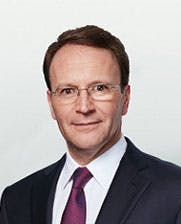Nestle Braces for Slowdown as New CEO Plans Restructuring
Nestle SA’s new Chief Executive Officer Mark Schneider said it will take years to return to the growth rates targeted by his predecessors and will consider exiting underperforming businesses if he can’t fix them.
The world’s largest food company forecast revenue will increase 2% to 4% on an organic basis this year, below a long-held goal of 5% to 6%. The stock fell as much as 2.1% as Schneider also said Thursday restructuring costs will rise to about 500 million francs (US$498 million) in 2017, putting pressure on profitability.
It’s taken less than two months in the job for Schneider to modify the annual growth forecasts Nestle has held onto for more than a decade. Revenue growth was 3.2% in 2016, missing analysts’ estimates and the slowest in at least a decade, illustrating the long list of challenges facing the new CEO. Those include deflation in Europe, declining sales in China, inflation in Brazil and Russia, and increasing competition in the U.S. chocolate market.
“It is a kind of a back-to-reality,” Pierre Tegner, an analyst at Natixis, said in a note. “The outlook shows that there is a lot to do.”
In 2005, Nestle (IW 1000/30) began targeting 5% to 6% average annual sales growth and improvement in the margin, excluding currency shifts. Schneider said that range is too narrow for coming years, without saying whether the goals, dubbed the “Nestle Model,” are being retracted. He said the new guidance is “roughly” the same thing. The food company forecast this year’s margin will be little changed due to the restructuring.
It’s “perhaps, the implicit official ‘death’ of the Nestle Model,” Andrew Wood, an analyst at Sanford C. Bernstein, wrote in a note.
Schneider, the first outsider Nestle has picked to be CEO in almost a century, said he sees acquisition opportunities in the health, food and beverage industries, speaking in an interview on Bloomberg Television. However, it’s not the time to make “big-ticket M&A” as valuations of consumer-goods companies are “lofty” amid low interest rates and rising stock markets, he said.
Nestle will first attempt to fix underperforming businesses such as the Chinese Yinlu food business, and sell those that are non-strategic if it’s not possible to return them to growth, said Schneider, a veteran of the healthcare industry. Nestle’s 23.2% stake in L’Oreal SA is a “highly strategic” asset and there is no short-term urgency to alter the relationship, he added. Analysts have speculated for years that Nestle could sell the stake to fund acquisitions.
“A turnaround and a durable earnings inflection will take longer than most expect,” said Robert Waldschmidt, an analyst at Liberum in London. “Schneider will first attack the weakness in the core portfolio. Disposals will likely precede larger acquisitions.”
Restructuring will focus on costs that are “non-consumer-facing,” such as administration and improving factory networks, the CEO said. Coffee is a business he said he plans to expand, and there’s “no flagrant contradiction” in holding onto chocolate businesses amid the health push.
Among other highlights:
- Trading operating profit rose 3.2% to 13.7 billion francs in 2016, trailing analyst estimates for 13.9 billion.
- Total sales rose to 89.5 billion francs.
- Excluding restructuring, trading operating margin should improve by 20 to 25 basis points this year: CEO.
- CEO Schneider reiterated predecessor Paul Bulcke’s target for cost savings to improve margins by 2 percentage points by 2020
- Pricing improved in second half and should continue getting better in 2017.
- Some raw material prices may become slight headwind in 2017, though Nestle hedges looking forward: CEO.
- CEO sees initial signs of consumer turnaround in 2017 in China; baby-food market there to remain “choppy.”
- Buybacks are lower priority than dividends, investing in business.
By Corinne Gretler
About the Author
Bloomberg
Licensed content from Bloomberg, copyright 2016.

